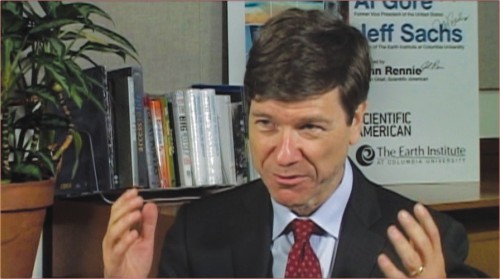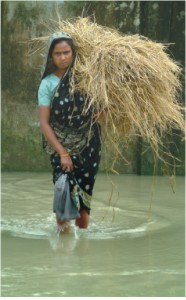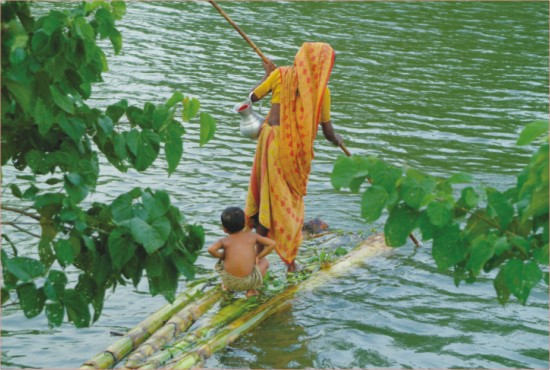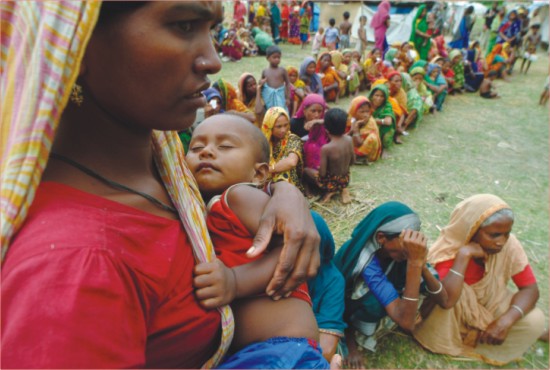
Inside
|
The Man with a Plan Adam Panetta talks to Jeffrey Sachs about millennium development goals and extreme poverty Twice-named one of Time Magazine's "100 Most Influential People in the World," Special Advisor to two UN Secretary Generals, author of New York Times bestsellers The End of Poverty and Common Wealth, Jeffrey Sachs has also ruffled a few feathers at The World Bank and the IMF. But even Sachs' strongest critics cannot question his sincerity and devotion to making the world a better place. Recently, Adam Panetta sat down with Professor Sachs at The Earth Institute to discuss Bangladesh, the Millennium Development Goals and the idea that extreme poverty can be eradicated by 2025.
What is extreme poverty and how does it differ from simply being 'very poor'? So Bangladesh is an extraordinarily vulnerable country. This is no secret. With a population of 150 million and rising crowded into a lowland delta that is still predominantly agricultural and highly vulnerable to every kind of natural hazard: availability of water, too much water, droughts, floods, storms, dangers of groundwater and so on, climate change is just another added dimension of tremendous complexity and tremendous risk.
Aside from moral claims that "it's the right thing to do," why is eradicating extreme poverty in Bangladesh's, let alone the world's interest? I try to explain to them [skeptics] how little it would take to empower impoverished people to break free of their extreme poverty. So this is not some great struggle where those who don't have are going to pull down those who do, which is one of the fears, I think, that people have. And then one can explain all the so-called instrumental reasons why living in a society that is divided between those who can barely survive and those who have more than enough or a world society like that is not only a tragedy, it's a huge mistake. Poverty breeds instability. Poverty creates the fulminant conditions for disease transmission. Poverty breeds political unrest and upheaval. Poverty breeds [the] mass migration of people, which is a thankless fact for those who are moving and sometimes for those who are receiving environmental refugees or displaced people from violence. And so my view is, in an interconnected world, not only does it stand to reason that in a world where there's enough money to solve these basic problems easily and readily we should do it, but we should appreciate the fact that everybody's well being is at stake when you have people who are struggling for their very survival. I always think back to John Kennedy's words in his inaugural address, the famous words that "if society cannot help the many who are poor, it cannot save the few who are rich," and that was an admonition to the rich in America. What are we thinking if we're not actively involved in helping to solve poverty in other places? You operate at two very different levels: one being the macroscopic world of billion-dollar budgets and global financial flows, the other dominated by more local issues like the procurement of malaria nets and access to safe drinking water for small rural villages. What is the relationship between these two very different areas of involvement?
But then simply to say "let them solve their problems" or "we'll tell them what to do" is pretty useless often because [extreme poor] people often know just what to do and they're so disempowered, they're so poor, they lack assets, they lack voice, they lack representation that they can't do these things on their own so the connections are a crucial solution to this. A return to democratic government in Bangladesh has raised hopes and expectations across the board. What is the government's responsibility in tackling extreme poverty and how does that fit in with the work presently being carried out by NGOs? Now the NGO community can accomplish certain things. It can accomplish awareness; it's proven that it can accomplish some basic services. It can accomplish introducing new approaches into communities that it has pioneered and then spread worldwide, like microfinance. But without government, one will not have a fully functioning public health system, that's for sure. You cannot make a public health system on the back of NGOs. I don't believe you can make an education system on the back of NGOs. And I'm sure you cannot make a proper power grid, a proper water and sewerage system, a proper road network, a proper climate resiliency and larger scale environmental management system based on community NGO activity. And so the upshot is that the NGOs are vital for what they do but they are not a substitute for government, they are a complement of government. It should be a healthy relationship. It's also fine when there's some competition" who can do the services better?" there is no problem with that. But we absolutely need government for core functions. And the core functions, as I've mentioned, are infrastructure, the power grid, the water and sewerage systems, the road network, the port and airport systems, the communications network, although some of that is private sector. We need government for a proper public health system in the country. We need government to reach excluded populations, minority groups, populations living in more remote areas that absolutely will remain isolated and impoverished unless there's concerted help. So this has to be a system that engages civil society, that engages government and engages the private sector.
Speaking of active solutions, what role do the Millennium Development Goals (MDGs) stand to play in the eradication of extreme poverty and why are they important? And the reason I like these goals is that when you start asking that question, then you get specific because whether it's nutrition interventions, whether it's early childhood development programs, whether it's emergency obstetrical rooms available for women in complicated labor or hemorrhaging, you get down to specifics. Then you draw the map and say "who has access to these services and who doesn't have access? Why don't they have access? Oh, because we can't afford it in these places. Well, maybe we can't afford it but Europe can afford it for Bangladesh or the United States can afford it for Bangladesh and the World Bank can afford it for Bangladesh. So let's get serious." And that's the partnership. Are the MDG targets realistic and achievable? Where is the bridge between this global policy set forth by the United Nations and poor rural villages in remote areas of Bangladesh or Ghana?
In The End of Poverty, you maintain that there is no "magic bullet" and in the same vein, through your Millennium Villages Project you've promoted a more holistic village-level approach to tackling extreme poverty. Can you tell me about that? If you could deliver a message to all Banglade-shis, what would that message be? The views expressed are those of the author and in no way reflect the views of their employers. Adam Panetta is the Media and Communication Manager at shiree.
|




